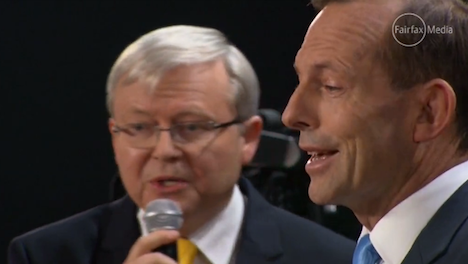The consensus is that prime minister Kevin Rudd, behind narrowly in the polls, had a better performance in the second leaders’ debate earlier in Brisbane, turning his underdog status as a way to poke holes in the platform of his rival, opposition leader Tony Abbott.![]()
At one point, Rudd harped so much about the cuts that Abbott might make as prime minister that Abbott snapped, ‘Does this guy ever shut up?’
It’s a sentiment many of Rudd’s rivals — from former Liberal/National Coalition prime minister John Howard to Labor prime minister Julia Gillard, who Rudd deposed as Labor leader only in June.
But Rudd’s tenacity resulted in at least one major concession from Abbott — that Abbott’s plan to cover the costs of a $5.5 billion paid parental leave scheme are insufficient.
Rudd parried with Abbott on the carbon tax that Rudd initially championed, Gillard ultimately enacted and Abbott hopes to repeal. Rudd warned Abbott that the rest of the world, including the People’s Republic of China, is moving toward Australia’s carbon scheme — China launched its first experimental carbon scheme earlier this year in Shenzhen.
Rudd returned to his pledge from the first debate to introduce a bill legalizing same-sex marriage if Labor wins a third consecutive term, and Abbott reiterated his opposition to marriage equality, however gingerly — Abbott’s sister is gay:
All I can do is candidly and honestly tell people what my view is. I support the traditional definition of marriage as between a man and a woman. I know that others dispute this, because I have lots of arguments inside my own family on this subject now.
The two also bickered over asylum policy, an issue upon which Rudd and Gillard have now both made such a 180-degree turn that Labor’s policy on granting asylum to migrants who attempt to arrive in Australia by boat is now much tougher than the Howard government’s policy in the mid-2000s.
Rudd also repeatedly singled out Abbott’s record as health minister and he cheerfully alleged that Abbott cut $1 billion from public hospital budgets while in government. Abbott denied the charges, arguing that the Howard government cut the rate of growth in spending, and he asked Rudd to stop telling fibs.
Commentators did not necessarily believe it was the kind of debate that marked a massive turning point in the campaign, though most agreed Rudd performed better than in his first debate:
In an early sign that the Labor leader needed a punchier performance than he had put in at the first debate nearly a fortnight ago, Mr Rudd capitalised first on the more flexible format of the people’s forum in Brisbane’s Broncos Leagues Club to accuse Mr Abbott of having ”ripped” $1 billion from hospital budgets and of planning further cuts. It was a charge Mr Abbott flatly denied after using his opening remarks to remind voters of Labor’s record in office.
Michael Gordon, political editor for The Age, argues that Rudd won narrowly:
The Prime Minister set the tone early, acknowledging Abbott was way ahead in the polls and would easily win if the election was held now. So why wouldn’t Abbott come clean on costings, he demanded. ”People have a right to know.”
In contrast, Abbott delivered the stock lines that have served him well so far. ”If you had your chance and it didn’t happen, why should you be given another chance?” is how he summed up the case against returning Labor. Rudd pressed and badgered, and Abbott’s discomfort was palpable.
”I was one of two cabinet ministers who opposed it,” he said of the Howard government’s WorkChoices. ”That particular policy is, to use the famous phrase, dead, buried and cremated. It is never going to happen, we are not going to go back to the past. We learnt our lesson.”
”We lost an election on it and the last thing sensible political parties do is go back to policies that cause them to lose elections.”
